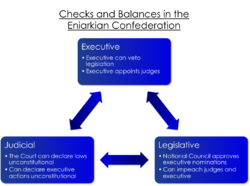Eniarkian National Council
National Council Національна Pада | |
|---|---|
 | |
| Type | |
| Type | |
| Leadership | |
| Seats | 7 |
| Elections | |
Last election | N/A (government formed on October 24, 2011) |
The National Council of the Eniarkian Confederation (Ukrainian: Natsional'Ni Rada iz Eniarku) is the official, unicameral legislative body of the Eniarkian Confederation. It was established upon the declaration of the confederation on October 24, 2011.
History
The National Council was founded on October 24, 2011, when the Eniarkian Confederation was created from the now-defunct Empire of Eniarku. Throughout the nation's history, the legislative branch has generally been considered the weakest of the three, and upon the founding of the confederation, politicians and citizens alike had an increased demand for a competent legislature. During the time of the Republic of Eniarku, lawmaking power was divided between two houses: the Senate and the House of Representatives, nearly identical to the structure of the U.S. Congress. When the Communist rule was established in February 2010, the bodies were consolidated to form the National People's Congress, essentially a unicameral puppet body of the Eniarkian Worker's Party.
Upon unification of New Europe, Ohio, and the DPRE in November 2010 to form the North American Confederation, the delegates from each state decided to form a two-house legislature, the North American Congress, made up of the Senate and the House of Representatives. When the NAC broke up in April 2011, Eniarku was reformed to a monarchy, and with that the National People's Congress was renamed the National Council, a bicameral body made of the Imperial Council and the Imperial Duma. Finally, shortly before the empire collapsed and the confederation took its place, the two houses were combined into one, and soon the National Council of the Eniarkian Confederation was formed.
The National Council combines elements from numerous legislatures around the macronational world, yet takes a unique form of direct democracy from Switzerland. Deputies are elected every six months by their constituents in their canton, and are eligible for an unlimited number of terms. Territorial Attorneys are appointed by the Federal President to represent their particular territory, while members of the Federal Council, the Federal President, and the Federal Chancellor are automatically members of the National Council. The number of Deputies per canton is limited to three, however, the is very seldom more than one elected delegate per constituency; the number of Territorial Attorneys is limited to one per territory. Any acquired protectorates are not entitled to representation.
These protocol have been followed for most of Eniarku's existence; as a result, there have never been more than 12 members of the legislature at any given time.
Membership
The National Council is composed of the Federal President, the Federal Chancellor, members of the Federal Council, deputies from other appointed constituencies (abbreviated DPT), and Territorial Attorneys (the delegates representing Eniarkian territories, abbreviated TA). Membership of the Council is determined by the following factors:
- The President is automatically a member of the Council
- The Chancellor is automatically a member of the Council
- Members of the Federal Council are jointly appointed by the President and Chancellor
- Deputies from other constituencies are elected every six (6) months by residents of their respective areas
- Territorial Attorneys are appointed directly by the President
Qualifications
The National Council (not the judiciary) is the sole judge of a councillor's qualifications. Earlier in Eniarku's history, newcomers to the legislature were not as heavily scrutinized to conform to requirements as they are at present. The Committee on Domestic & National Council Affairs sets the requirements for membership as follows: (1) each candidate must be at least 12 years of age, (2) must have been a citizen of Eniarku for at least six months prior, and (3) must be, at the time of election, a resident of the canton or territory he or she wishes to represent. A candidate is not eligible if he or she has committed a felony; if a councillor commits a felony-level offense during a term in office, their rights as a member of the National Council are suspended until a hearing and (if applicable) a trial is/are completed by the Committee on the Judiciary & Law Enforcement.
Election and terms
Elections for deputy positions are to take place on January 1 and July 1 of each year. Cantons use a voting system unique to their canton, and all voting is concluded by 11:59 PM the day it begins; after all the votes are tallied, the new membership is announced on January 2 and July 2 respectively in the Council's chamber in the Capitol Building. After this, the first sitting of the new Council is to take place, with opening statements from each new councillor being read and the projections for the upcoming term being announced. Next, councillors are asked to disperse and form the four non-Select committees (all but the committee on intelligence); the chairs for each committee are then decided amongst each committee's members. Finally, the Council reconvenes and the Federal President (who acts as the chair for this meeting) closes the session. This day marks the beginning of the term for each new or re-elected councillor, and they remain in their capacity until the next election day.
Powers

The National Council has certain powers specifically delegated to it by Eniarkian law that are regulated by the checks and balances system, most of which are listed here:
- The Council is the only legislative body allowed to create and change laws in the Confederation
- The Council can impeach federal ministers and civil servants
- The Council is the only body allowed to declare war on another nation
- The Council is the only body that can remove powers of the executive branch and its members
- The power to approve amendments to laws, or the passage of bills that would override existent laws
- The power to maintain the nobility system and awards; and
- The power to approve nominations made by the Federal President for judges of the Supreme Court;
- The power to (in a time of war) deploy the Armed Forces to attack an enemy;
- The power to approve a decree of the Federal President that introduces martial law;
- The power to ratify treaties and other diplomatic documents
- The hearing of bi-annual reports by members of the Federal Government on its work that term, as well as its plans for the next
- Deciding on the issue of confidence in the current government
Committees
For most of the areas the Federal Government controls, there is a corresponding committee in the National Council that is composed of councillors that hear petitions or referendums on certain matters of government, such as intelligence or internal affairs. As there are few members in the National Council as of March 2012, there are few committees, and those that exist have few members, and most councillors serve on more than one committee. Below each committee are its general duties.
Committee on Domestic & National Council Affairs
- Maintaining hearings on matters to do with domestic affairs
- Maintaining preliminary and confirmation hearings for presidential appointees to the Secretaryship
- Maintaining preliminary and confirmation hearings for presidential Territorial Attorney appointees
- Maintaining preliminary and confirmation hearings for approval of elected Deputies
- Hearing citizens' complaints and/or petitions on matters such as, but not limited to: (1) the environment, (2) development, (3) natural resources, (4) use of federal and non-federal land
Committee on Foreign & International Affairs
- Maintaining hearings on matters to do with foreign affairs
- Maintaining preliminary and confirmation hearings for presidential appointees to the Secretaryship
- Hearing citizens' complaints and/or petitions on matters such as, but not limited to: (1) the international/intermicronational sphere, (2) the position of Eniarku in intermicronational politics, (3) treaties that have been presented to the National Council, (4) conflict between a citizen/resident/dual-citizen and a foreign body or nation
- Advising the Federal President and the Secretary of State for Defense on the National Security Readiness Condition
Committee on the Judiciary & Law Enforcement
- Maintaining hearings on matters to do with the Judiciary and/or law enforcement
- Maintaining preliminary and confirmation hearings for presidential appointees to the Secretaryship
- Maintaining preliminary and confirmation hearings for presidential appointees to federal and territorial judgeships
- Regulating federal law enforcement agencies and maintaining hearings for new headships
- Maintaining preliminary and primary impeachment hearings and trials of federal officials
- Hearing citizens' complaints and/or petitions on matters such as, but not limited to: (1) the judicial system, (2) Eniarkian law, (3) treatment in the legal system, (4) political, human, and civil rights, (5) local or federal law enforcement, (6) treatment by law enforcement
Committee on Defense & Armed Services
- Maintaining hearings on matters to do with defense and the Armed Forces
- Maintaining preliminary and confirmation hearings for presidential appointees to the Secretaryship
- Maintaining preliminary and confirmation hearings for new Chiefs of Staff of the Armed Forces
- Hearing citizens' complaints and/or petitions on matters such as, but not limited to: (1) the defense of Eniarku, (2) national security, (3) treatment in/by the Armed Forces, (4) contracting to the Secretariat for Defense, (5) changes in the hierarchy or ranking system
- Advising the Federal President and the Secretary of State for Defense on the National Security Readiness Condition
Select Committee on Intelligence
- Maintaining hearings on matters to do with intelligence
- Maintaining preliminary and confirmation hearings for presidential appointments to the Directorship of the GID
- Hearing citizens' complaints and/or petitions on matters such as, but not limited to: (1) foreign or domestic intelligence, (2) gathering and dissemination of intelligence, (3) appropriations/authorizations granted to members of the Intelligence Community
- Reviewing the National Security Intelligence Assessment prepared by the GID and other intelligence sources
- Advising the Federal President and the Secretary of State for Defense on the National Security Readiness Condition
Bills, motions, and petitions
The National Council and its members have recently been taking advantage of their role in Eniarkian politics as well as on the legislative stage, drafting more bills, petitions, and motions than ever in Eniarku's history. Below is a list of some of the motions that have been passed and current petitions that are being debated upon in the Council's sessions.
| Name | Type | Subject | Date passed | Endorsers | Notes |
|---|---|---|---|---|---|
| Official Petition to the National Council on the Establishment of Diplomatic Relations with the Federal Mandate of Havnesgade-Amager, and Approval of the Treaty Establishing said Relations | Official Petition | To establish diplomatic ties and approve the treaty with the Federal Mandate of Havnesgade-Amager | 12/29/12 | All voting National Councillors | ~ |
| Emergency Official Petition to the National Council on the Establishment of the Special Administrative District of the Federal Mandate of Havnesgade-Amager by the First of January in the Year 2012 | Emergency Official Petition | To incorporate the Federal Mandate of Havnesgade-Amager as a Special Administrative District of Eniarku | 12/31/12 | 2 in favor, 1 against, 1 abstain | ~ |
(More to come)